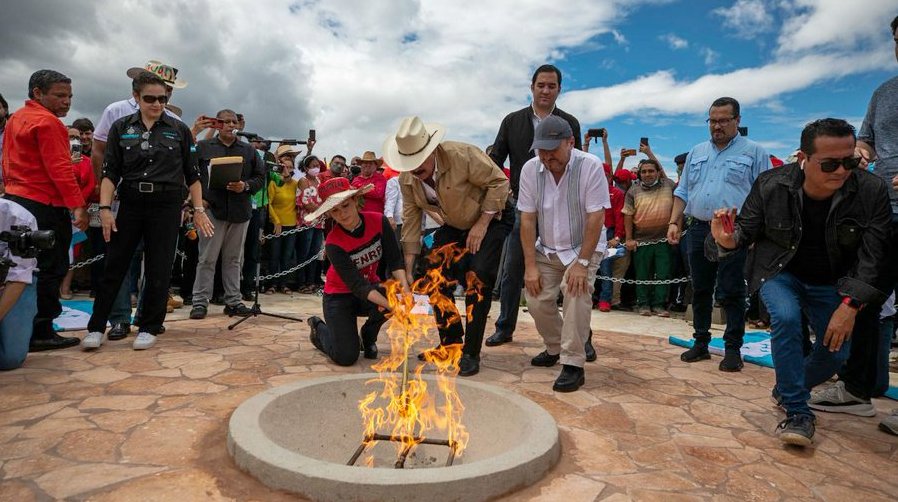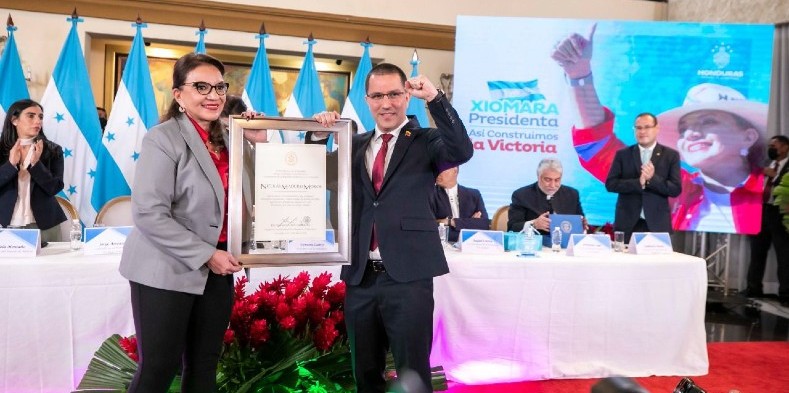In the News July 13
Honduras
Those Who Stood with the Honduran People Honoured on Anniversary of 2009 Coup

Eternal flame in Tegucigalpa, June 26, 2022, for martyrs of the 2009 coup.
The 13th anniversary of the U.S.-backed coup which overthrew democratically elected president Manuel Zelaya and his government on June 28, 2009 was commemorated this year with a number of political-cultural events. Hosted by President Xiomara Castro and Zelaya, in his present capacity as Coordinator of the governing Freedom and Refoundation Party (LIBRE), the activities included forums, concerts and the inauguration of a square in Tegucigalpa dedicated to the martyrs of the Honduran people’s resistance. It was named after 19-year-old youth, Isy Obed, shot dead by police on July 5, 2009, the first of many who would be killed for protesting the coup.
The LIBRE government, which in November handed the National Party of the coup forces a resounding electoral defeat, used the anniversary to announce that it has resolved to grant scholarships, pensions, psychological care, decent jobs, health care, housing and justice to the family members of those who lost their lives resisting the coup.
On June 27, representatives of social movements and political organizations from several countries took part in a public forum on Latin American integration at the presidential palace. Another forum, entitled “A New Democratic Constitution so These Acts Are Not Repeated,” was held on June 28.
Representatives of current and former governments and political parties that condemned the coup and stood in solidarity with Manuel Zelaya, his government and the Honduran people’s resistance were remembered and honoured at the forum. Some of those who President Xiomara Castro said her government had the duty and historic responsibility to pay homage to were Presidents Nicolás Maduro of Venezuela and Daniel Ortega of Nicaragua, former presidents Cristina Fernández (Argentina), Evo Morales (Bolivia), Fidel Castro and Raúl Castro (Cuba); Rafael Correa (Ecuador), Fernando Lugo (Paraguay) and Hugo Chávez (Venezuela).

Venezuela honoured during celebrations in Tegucigalpa on the 13th anniversary of the 2009 coup.
The Honduran people have waged a very courageous and heroic resistance struggle against the brutal crimes and repression of the U-S.-backed coup regime, also recognized by Canada which claims it stands for a rules-based order and human rights. Canada should be made to answer for its sponsorship of the criminal regime the coup installed in Honduras.
Honduras is a small country with a population of 10.1 million persons in 2021. It occupies 112,492 km2 (43,433 sq mi). It has been mercilessly exploited and repeatedly invaded by the United States: in 1903, 1907, 1911, 1912, 1919, 1924 and 1925 in what some historians call the Banana Wars waged in Central America and the Caribbean. Since then, the U.S. has continued committing untold crimes in that country which it has always treated as its possession where it can do whatever it wishes.
In Honduras, after backing the 2009 coup d’etat and installing a regime which served its interests, the U.S. government provided training, supplies, and funding for Honduras’ police and military. The U.S. oversaw the creation of the “Military Police for Public Order” (PMOP), the Interinstitutional National Security Force, and the “Tigres” (Tigers). These units, comprised of either former soldiers or what were called “soldiers specializing in police duties,” were used to viciously repress those who refused to accept the organized electoral fraud of 2017 which permitted National Party President Juan Orlando Hernández to continue the coup for another four years. Police in Honduras numbered 13,752 in 2016 and 20,193 in 2020.
Soto Cano, the large U.S. airbase in eastern Honduras, which the U.S. used as a staging ground for its dirty Contra War against Nicaragua in the 1980s, has more recently been used by U.S. Southcom for military exercises, and to periodically receive from 500 to 1,500 troops to carry out short-term “missions” throughout the region, supposedly for humanitarian or drug war purposes.
Economic Development and Employment Zones (ZEDE) were established which operated with impunity. They envisioned privately owned and operated “autonomous cities and special investment districts” attracting foreign investment and welcoming tourist and real estate ventures, industrial parks, commercial and financial services, and mining and forestry activities. All of this was fully supported by the government of Canada. The law authorizing the creation of ZEDEs was repealed by unanimous vote of the Honduran Congress in April at the behest of President Xiomara Castro.
The U.S. also established the National Port Authority in Puerto Cortés as part of the U.S. Bureau of Customs and Border Protection’s Container Security Initiative.
In 2021 the poverty rate in Honduras was over 70 per cent, up from 47.60 per cent in 2009 and 59.3 per cent in 2019. Of formally employed workers, 70 per cent work intermittently; 82.6 per cent of Honduran workers participate in the informal sector. The COVID-19 pandemic led to more than 50,000 businesses closing and some 500,00 Hondurans losing their jobs. Another 30,000 small businesses disappeared in 2020 owing to floods caused by hurricanes.
Among Central American countries, Honduras, followed by Guatemala and Mexico, registered the highest increases in the rate of emigration between 1990 and 2020. The rate increases were: 530 per cent, 293 per cent, and 154 per cent, respectively. Between 2012 and 2019, family groups arriving from Honduras and apprehended at the U.S. border skyrocketed from 513 in 2012 to 188,368 in 2019.
The government of Canada actively supports mining interests which have used paramilitaries and state agencies for “protection” who have wantonly killed Indigenous peoples and small farmers and peasants who stood in their way.
Activists from among the workers, campesinos, students, women and intellectuals fought without let-up day in and day out. They fearlessly faced the guns, assassinations and torture of the U.S.-supported regime whose puppet president Juan Orlando Hernández was known to have accepted millions of dollars in bribes during his eight years as president in exchange for protecting drug traffickers from investigation, arrest and extradition. Following his electoral defeat he was extradited to the U.S. to face drug trafficking and related charges to which he has pleaded not guilty.
The resistance forces won the recent presidential election and are now using the political power in the service of the people. They have won the right to set the direction for Honduras and will do so with the same courage and conviction with which they faced the crimes committed against them by the criminal elements put in power and supported by the U.S. in 2009. Canada will have to account for its role in appeasing the U.S. crimes and becoming an integral part of them.
TML Daily, posted July 13, 2022.

|

|

